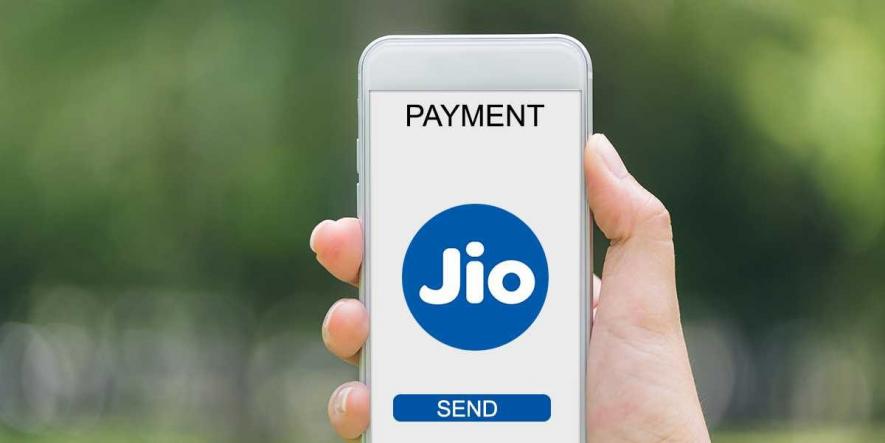Jio Payments Bank and SBI: A Camel Inside A Tent?

Mumbai/Gurugram: There’s a classic tale. One cold night, a camel asks his master if he could put his nose inside his tent for warmth. “By all means and welcome,” says the man, and the camel stretches his nose first, and then his head into the tent.
Soon afterwards, the camel asks the man if he can bring his neck and front legs inside the tent. Again, the master agrees. Finally, the camel asks: “May I not stand wholly within?”
With pity, the master beckons him into the warm tent. But when the camel comes forward, it becomes clear that the tent is too small for both of them. “I think,” the camel says, “there is not enough room for both of us here. It will be best for you to stand outside, as you are smaller; there will then be room enough for me.”
With that, the man is forced outside his tent.
Is the relationship between Jio Payments Bank, a company that is part of Reliance Industries Limited (RIL), and State Bank of India (SBI), analogous to the story about the camel and his master’s tent? A former managing director of the SBI certainly thinks so. But, more about that a little later.
RIL is India’s largest private corporate entity headed by Mukesh Ambani, the richest man in the country and one of the richest in the world. The SBI is India’s biggest bank in the public sector.
In a previous article in this series, we had examined whether the large international investments in Jio Platforms by investors from the United States, Abu Dhabi and Saudi Arabia, raised security concerns. In this article, we take a closer look at a specific aspect of the same issue.
NewsClick spoke with three former office-bearers of unions and associations of employees and officers of banks, two top former officials of SBI as well as two analysts on issues relating to conflicts of interest and the security implications of the partnership between Jio Payments Bank and SBI.
Questionnaires were emailed to the Governor of the Reserve Bank of India (RBI), a former RBI Governor, the current SBI Chairman and a former Chairperson of the bank.
Till the time of publication, no responses had been received. This article will be updated if and when the individuals concerned respond.
Is SBI Helping Jio Payments Bank?
Jio Payments Bank was launched as a joint venture between SBI and Reliance Jio in April 2018. It is a 30:70 joint venture between the two with SBI’s 30% holding valued at Rs 69.3307 crore", according to the bank’s annual report for 2018-19.
According to filings with the Registrar of Companies under the Ministry of Corporate Affairs, Jio Payments Bank Limited was incorporated on April 3, 2018, and is operating under the Banking Regulation Act, 1949. As on March 31, 2019, it reported a net loss of Rs 1.10 crore and owned assets worth Rs 270 crore, of which Rs 225 crore were held in the form of government securities.
The payments services of Jio Payments Bank are provided through SBI’s You Only Need One or YONO platform, a digital banking application launched by SBI in 2017.
The SBI Chairman who put these deals in place, Arundhati Bhattacharya, joined the board of RIL as an additional independent director, days after the end of the one-year “cooling off period” following the completion of her tenure at SBI that ended in October 2017. Not surprisingly, the configuration of the SBI-RIL association raises questions of conflict of interest.
Conflicts of Interest?
Thomas Franco, former all-India general secretary of the All India Bank Officers Confederation, told NewsClick: “At the time it was set up, it was said that the partnership with Reliance would help SBI reach rural areas and help bring innovations in technology. Now, SBI is the biggest bank in the country. It has no restrictions on opening more branches anywhere in the country. For that it does not require the partnership of Reliance Jio.”
Franco added: “SBI has always been the leader as far as technology for the banking sector is concerned. The first core banking solution was brought by SBI. The bank even started the SBI Institute of Innovation and Technology and, through it, modified the software to make it suitable to our conditions.”
The veteran banker raised a question: “Why would SBI go to Reliance for technology innovations?”
He wondered if Jio Payments Bank would be granted access to the entire database of accounts of SBI, pointing out: “Reliance Jio Payments Bank has no minimum balance requirements, no service charges, compared with SBI. After getting access to SBI’s database, Jio Payments Bank would be able to attract the smaller account holders from SBI by offering them more attractive terms.”
Franco said Reliance Jio could apply for a universal banking licence and if it is granted such a licence, “it could easily seek to remove SBI from the joint venture and emerge as the SBI’s biggest competitor.” He added: “Arundhati Bhattacharya, as SBI Chairman, had approved massive loans to Reliance Jio and signed the Jio Payments Bank deal. She is now sitting on Reliance’s board (of directors). Isn’t this conflict of interest? SBI has facilitated the growth of its own competitor.”
Devidas Tuljapurkar, former joint secretary of the All India Bank Employees Association (AIBEA) and Vishwas Utagi, a former vice president of AIBEA, concurred with Franco. “It (the conflict of interest) should be contested in the courts in my opinion,” said Utagi.
Tuljapurkar added: “In India, some big corporates seem to be above the law. They don’t want to adhere to certain cardinal principles of good corporate governance, such as avoidance of conflict of interest. There are representatives of both the Ministry of Finance and the banking sector’s regulator, the RBI, on the board of directors of SBI, and considering that these persons have clearly not found anything amiss or unusual in the bank’s association with the Reliance group, it says a lot about their mindset.”
Former senior SBI executives agreed. Referring to Bhattacharya, a former SBI managing director said that “this is a clear case of favouritism as she was privy to the negotiations between SBI and the Reliance group’s Jio Payments Bank. I think it is downright immoral on her part to have accepted the post that was offered to her in RIL. How can she be described as an ‘independent’ director, I wonder.”
This person asked how the valuation of the shares of the joint venture was done to arrive at the figure of Rs 69.3 crore for a 30% stake in an entity that was then yet to commence operations. “To my mind, there is a clear conflict of interest in SBI investing in this bank since the products and services that are proposed to be offered by Jio Payments Bank are akin to those offered by SBI,” he said.
He pointed out that during the period when O P Bhatt was SBI Chairman between June 2006 and March 2011, the bank’s board of directors had rejected a proposal from the Bharti Airtel group to set up a joint venture for a similar small payments bank with mobile-banking facilities.
“It is far from clear as to what has changed since then for SBI to go ahead with a joint venture with the Reliance group,” the former MD of SBI stated, adding: “The association is reminiscent of the parable about how the camel got into his owner’s tent one cold night.”
Another top SBI source asked if “this is not a form of a ‘quid pro quo’ for going ahead with the joint venture between SBI and Jio Payments Bank. She (meaning, Bhattacharya) has not just hurt the interests of the bank she worked in for decades, but also undermined her own credibility.”
A second potential conflict of interest is the case of Manju Agarwal, who is on the board of Jio Payments Bank. Agarwal, a former SBI Deputy MD, was the Deputy Managing Director (Digital Banking and New Businesses) at the public sector bank in her last assignment. During her time at SBI, she launched the SBI’s YONO platform. Prior to her superannuation, she was also the SBI’s nominee director for the National Payments Corporation of India (NPCI), the regulator for the country’s payments and settlement infrastructure.
On June 3, one of the authors of this article emailed a questionnaire to Rajnish Kumar, the SBI Chairman, with a copy to the bank’s senior communications officer, asking the following questions:
- When did the SBI receive clearance from the RBI for its 30:70 joint venture (JV) with Jio Payments Bank in the Reliance group?
- Is it correct that the approval of the RBI was given to the SBI to establish the JV with Jio Payments Bank although the bank was yet to begin operations?
- On what basis was the valuation of the JV done to arrive at the figure of Rs 69.3 crore for a 30% stake in the bank?
- Is there not a clear conflict of interest in the SBI investing in this bank if the products and services that are proposed to be offered by the Jio Payments Bank are akin to those offered by SBI?
- Between 2007 and 2014, there were several reports that the SBI was in discussions with the Bharti Airtel group to set up a JV similar to the one it has with the Reliance group’s Jio Payments Bank. Is it correct that some of these proposals were rejected by the board of directors of the SBI? If yes, why were the Bharti Airtel mobile-banking proposals rejected and the Jio Payments Bank proposal accepted?
On the evening of June 30, the same email was resent to the SBI Chairman with an additional question:
- Ms Manju Agarwal, former Deputy Managing Director (Digital Banking and New Businesses) at the SBI has joined the board of Jio Payments Bank after superannuation. Is there not a conflict of interest in this regard?
No response was received from Rajnish Kumar at the time of publication.
Reliance’s Banking Ambitions
Speaking to these authors on condition of anonymity, a market analyst who was a former employee of the Reliance group, suggested that through its relationship with SBI, Reliance is seeking to realise its “ambitions” in the banking sector.
Striking a note of caution, the analyst remarked: “Reliance should not be given a banking licence. Traditional banking practices are such that entities which have large interests elsewhere are not given a banking licence because if the group’s other business go down, so does the bank.”
Speaking on the apprehensions about the group’s relationship with SBI, he said: “I don’t think Reliance would be able to take apart a bank as big as the SBI, institutionally speaking. But what it can do is leech from it all its knowledge, its talent and a large segment of its client base…this is a typical tactic that Reliance deploys.”
In India’s banking system, “payments banks” are a new addition to the different categories of banks. Governed by NPCI, these payments banks are perceived by some as having got a “backdoor” entry into the banking sector. A number of companies or corporate conglomerates that may otherwise have not been able to enter the sector due to regulatory barriers, have set up or are in the process of setting up payments banks.
The list of 11 names approved by the RBI in August 2015 for grant of provisional licences for setting up payments banks are:
- Aditya Birla Nuvo Limited
- Airtel M Commerce Services Limited
- Cholamandalam Distribution Services Limited
- India Post, GoI
- Fino PayTech Limited
- National Securities Depository Limited
- Reliance Industries Limited
- Dilip Shantilal Shanghvi
- Paytm Payments Bank Limited
- Tech Mahindra Limited
- Vodafone m-pesa Limited
In the list of active payments banks are:
- Airtel Payments Bank
- India Post Payments Bank
- Fino Payments Bank
- Jio Payments Bank
- Paytm Payments Bank
- NSDL Payments Bank
The Bharti Airtel group launched India’s first live payments bank in March 2017 followed by payments banks by Paytm, India Post, Fino and the Aditya Birla group. Cholamandalam Distribution Services, Sun Pharmaceuticals and Tech Mahindra have surrendered their licences, while the Aditya Birla Payments Bank discontinued its services from July 26, 2019.
Envisaged as providers of banking services that facilitate small payments and retail transactions, payments banks can offer its customers wallets with zero minimum balance requirements and para-banking services such as ATM (automated teller machine) cards. However, such payments banks cannot disburse loans to its customers or allow them to run retail bank accounts.
Another analyst, also speaking to the authors on condition of anonymity, pointed out that “in 2015, the then RBI governor Raghuram Rajan had come up with an On-Tap Policy for banking licenses.” He added that “under this policy, a permanent window was opened for applicants to apply and thereafter RBI would decide whether or not the entity was eligible or suitable to be issued a license.”
The analyst wondered why this on-tap policy was no longer being implemented. He asked: “Is the RBI now focusing on allowing well-capitalised entities, backed by large industrial houses or corporate conglomerates, early entry into ‘digital only’ banks without branches that offer mobile banking facilities?”
One of these authors reached out to Rajan for his comments over email on June 16 and again on June 30, but no response was received from him till the time of publication.
The analyst quoted said it is not clear when and if the existing payments banks would be allowed to issue credit cards or extend loans, adding: “I wonder if the current system can be compared with the controversial first-come-first-served system that was used to allocate second -generation (2G) telecommunications spectrum by the former Communications Minister A Raja.”
Even if this analogy can be disputed, what is difficult to controvert are the instances of conflict of interest.
Questions for Arundhati Bhattacharya
On June 15, one of the authors of this article (Paranjoy) sent the following questionnaire to Arundhati Bhattacharya, former SBI Chairperson. The questionnaire started with the following introduction:
On May 22, the Reserve Bank of India (RBI) hiked the group exposure limit of banks to a single corporate group from 25% to 30% till 30 June 2021. The limit will be restored to 25% after the deadline unless the RBI decides otherwise. The group exposure limit determines the maximum amount a bank can lend to one corporate group ostensibly to prevent troubles in one group entity spilling over to the entire group leading to systemic risks for banks. The Governor of the RBI Shaktikanta Das stated in his public speech: “In view of the current difficulty in raising resources from capital markets, the group exposure limit of banks is being increased from 25% to 30% of eligible capital base, for enabling corporates to meet their funding requirements from banks.”
- It can be argued that the single biggest beneficiary of the RBI’s decision to increase banks’ group exposure limits would be the corporate group led by Reliance Industries Limited (RIL). What are your comments?
- During your tenure as Chairman of the State Bank of India (SBI) between October 7, 2013 and October 6, 2017, were you involved in negotiations for setting up the 30:70 joint venture (JV) between the SBI and Jio Payments Bank in the Reliance group?
- Is it correct that the approval of the RBI was given to the SBI to establish the JV with Jio Payments Bank although the bank was yet to begin operations?
- On what basis was the valuation of the JV done to arrive at the figure of Rs 69.3 crore for a 30% stake in the bank?
- Is there not a clear conflict of interest in the SBI investing in this bank if the products and services that are proposed to be offered by the Jio Payments Bank are akin to those offered by SBI?
- Between 2007 and 2014, there were several reports that the SBI was in discussions with the Bharti Airtel group to set up a JV similar to the one it has with the Reliance group’s Jio Payments Bank. Is it correct that some of these proposals were rejected by the board of directors of the SBI? If yes, what were the Bharti Airtel mobile-banking proposals rejected and the Jio Payments Bank proposal accepted?
- We have been informed that the State Bank of India along with its asset management arm, through various mutual funds and through a combination of investments in the form of both loans and debt instruments have in recent years, including the period of your chairmanship, invested heavily in equity shares of companies in the Reliance group, helping it mostly maintain an “overweight” status in its valuation compared with the market weightage of the RIL group. Your comments are solicited.
- What is your role as additional independent director in Reliance Industries Limited?
No response was received from Bhattacharya till the time of publication. This article will be updated with her response as and when it is received.
Will Facebook Deal be Beneficial for Jio Payments Bank?
In January 2019, Mukesh Ambani, India’s richest man and promoter of the Reliance group, famously declared that “data is the new oil.” While the operations of Jio Payments Bank have remained at a relatively small scale till date, the deal by its parent group with international social media giant, Facebook, may represent a shot in the arm for its ambitions to refocus its businesses around the “new oil.”
When the all-India lockdown due to the COVID-19 pandemic was announced on March 24, e-commerce services, such as Amazon and Flipkart, were forced to shut down much of their operations and permitted to only deliver “essential services”, as defined by the government.
On May 23, two months after its competitors faced a drastic reduction in business, Reliance launched its ecommerce business, JioMart, a collaboration between Jio Platforms and Jio Retail, that uses Jio Payments Bank platform for processing payments.
As explained by H Srikrishnan, Jio Payments Banks’ Managing Director and Chief Executive Officer, this integration into the Reliance ecosystem and dependence on the large consumer bases of Reliance’s key businesses, such as Jio Platforms and Jio Retail, will be the key to the growth model of Jio Payments Banks’ growth. He said in an interview in March 2020:
“The model is to facilitate payment, facilitate cash to be converted to digital and act as a catalyst for doing that. From that perspective, the businesses which currently incur huge costs on cash, like in some of our parent’s businesses, we will work towards making them more efficient by migrating to digital mode. There is a huge task ahead of us because now, Reliance Jio or Reliance Retail have very huge numbers.”
With JioMart launching in an environment well suited for digital service delivery, it is likely to lead to a boost in Jio Payments Banks’ customer base.
(To be continued.)
The first six articles in the series can be accessed here:
Read Also: Ambani Family Reshuffled Shares in Reliance Industries Before Facebook Deal
Read Also: Is Reliance’s Rights Issue Over-Valued?
Read Also: Did the Government Help Reliance Industries Raise Rs 53,000 crore?
Read Also: Foreign Investments in Reliance Jio: A Security Concern?
Read Also: RBI Hike in Banks’ Group Exposure Limit to Benefit Reliance
Read Also: How a Change in a Rule by SEBI Helped Reliance Raise Rs 53,000 Crore
The authors are independent journalists.
Get the latest reports & analysis with people's perspective on Protests, movements & deep analytical videos, discussions of the current affairs in your Telegram app. Subscribe to NewsClick's Telegram channel & get Real-Time updates on stories, as they get published on our website.
























